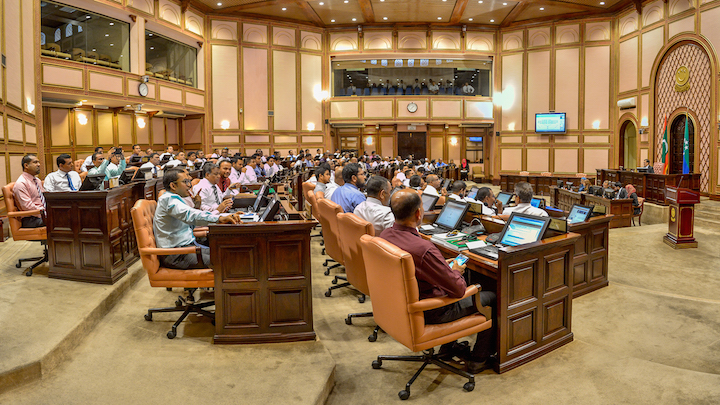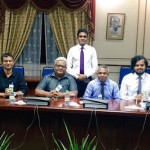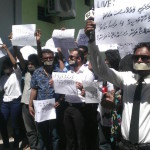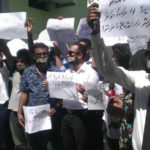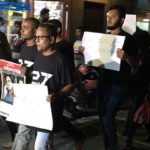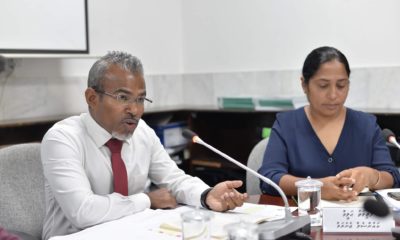The ruling party-dominated parliament voted today to accept a bill on criminalising defamation and restricting free speech, disregarding forceful international criticism and a free speech campaign by local journalists.
After a heated debate, MPs voted 38-28 with one abstention to send the bill to an 11-member ad-hoc committee for further review.
A committee meeting was underway at the time of publication. As ruling party lawmakers have previously indicated that the bill will be fast-tracked, it is likely to be passed into law this week.
Pro-government lawmakers who defended the bill today said defamation and slander are grave sins in Islam. Limits must be placed on freedom of expression to protect other constitutional rights such as the right to protect one’s good name and reputation, they contended.
But opposition MPs accused the government of seeking to stifle dissent and silence criticism over the unprecedented theft of nearly US$80 million from state coffers.
Several MPs also said public officials must have the courage or “thick skin” to face criticism.
A group of journalists meanwhile gathered outside the People’s Majlis in protest this morning but riot police quickly pushed them back.
Journalists fear the proposed law would be the death knell for press freedom in the Maldives. It prescribes fines of up to MVR2 million (US$130,000) and a jail term of up to six months for those unable to pay the fine.
But ruling party MP Jaufar Dawood, who sponsored the bill, insisted it would not obstruct press freedom, suggesting that journalists were criticising it without proper scrutiny.
The bill includes a “whistleblower defence” for media, Dawood said, whereby reporting illegal conduct, cover-ups, or actions by state institutions that endanger lives or the environment would be protected.
Some of Dawood’s colleagues in the ruling Progressive Party of Maldives, however, did not agree.
MP Ahmed ‘Redwave’ Saleem said the public should be able to criticise rulers and hold them accountable.
MP Mohamed Nasheed, who played an important role in introducing press freedoms as information minister during the last years of former President Maumoon Abdul Gayoom’s 30-year reign, highlighted three main concerns.
While media regulatory bodies are authorised to impose fines of up to MVR2 million, Nasheed objected to a provision that bars journalists from filing an appeal without first paying the fine.
The constitution guarantees the right to appeal administrative actions deemed to be unfair, he said.
Secondly, Nasheed noted that the bill would prevent journalists from reporting allegations if the accused refuses to comment, preventing coverage of speeches at political rallies.
He also objected to the bill placing the burden of proof on the defendant, who must establish in court the truth of the offending statement.
Striking a balance between the constitutional rights to free speech and to protect one’s reputation is a “delicate task”, Nasheed suggested.
“I don’t believe this bill achieves that,” he said.
Nasheed abstained in today’s vote. PPM MP Faris Maumoon, son of the party’s leader, voted against the party’s whip line again.
Majority Leader Ahmed Nihan meanwhile said he voted against decriminalising defamation in 2009 because unrestrained freedom of expression since 2004 has created discord and division in Maldivian society.
Defamation is also a criminal offence punishable with imprisonment in some 19 European countries, he said.
The bill only criminalises speech that is either defamatory, contrary to Islamic tenets or general societal norms or deemed to pose a threat to national security, Nihan said.
“So only false reporting is criminalised,” he said, assuring social media users they will not be prosecuted over tweets or Facebook posts.
Both Nihan and Dawood pledged to address legitimate concerns of journalists at the committee stage.
Responding to Nihan’s remarks, opposition MP Rozaina Adam said other nations also have anti-terror laws, “but it is only in the Maldives that political leaders were arrested under such a law.”
MP Mariya Ahmed Didi, also of the main opposition Maldivian Democratic Party, expressed concern with the misuse of the 2013 freedom of assembly law to ban street protests in Malé.
Minority Leader Ibrahim Mohamed Solih said the government’s target is destroying press freedom. Democracy in the Maldives would be on “life support” if the bill is passed into law, he warned.
Jumhooree Party MP Abdulla Riyaz, a former police chief, observed that the bill does not define national security while the Maldives lacks a national security law.
“This bill wasn’t submitted to reform the country or to strengthen that social fabric they refer to. This is a proposal to defend [the president] from the arrows thrown at him,” he said.

